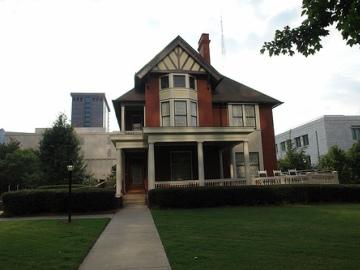
Section Branding
Header Content
Mitchell's Racial Legacy Is Two-Sided
Primary Content

Racial stereotypes are as much a part of "Gone with the Wind" as its memorable lines and sweeping drama.
As the book turns 75, GPB is airing a three-part series on its Atlanta author, Margaret Mitchell.
In our final story we report on her relationship with African-Americans.
St. Simons Island author Tina McElroy Ansa remembers seeing the movie "Gone with the Wind" as a teenager.
Before going, her mother gave her a warning.
"She said, 'It was about us and we look silly in it,'" Ansa says.
In the movie, actress Hattie McDaniel plays a domestic whose lines include, "Now you scrub yourself with that strong lye soap before I come in there and scrub you myself! I'm going to put these britches in the boiling pot!"
Modern critics generally give the book better marks for representing blacks than the movie.
But Ansa says, both were deeply flawed.
"There were no 'happy darkies' taking care of white folks and 'Everything was just fine' and 'It wasn't really their story,'" Ansa says. "Always marginalized, always bringing in food and getting out."
Mitchell was writing about the Civil War Era.
And she wrote in the 1920's and 1930's at a time of lynchings and a rising KKK.
Statesboro historian Annette Laing says, some call the era the nadir of American race relations.
"That mentality was still very much prevalent when Mitchell was writing," Laing says.
The author was a teenager in 1915 when the Birth of a Nation came out.
And Mitchell certainly would've seen DW Griffith's racially-inflammatory film.
Savannah College of Art and Design film coordinator Roger Rawlings says, while Griffith focused on a racial agenda, Mitchell used race as scenery for an epic drama.
"Birth of a Nation was an angry, bitter film," Rawlings says. "Gone with the Wind offers pity and empathy, and not only for the white characters, but for all the characters."
And that's where things start to get complicated with Mitchell and race.
Tina McElroy Ansa says, Gone with the Wind hooked African-Americans, too.
"I can appreciate the storyline and the dialog, like 'I'll never be hungry again,'" Ansa says. "All these things that were parts of the book that engaged my mother, she passed along to me."
Those dramatic scenes would include Scarlett O'Hara's tear-filled plea for Rhett Butler to stay, to which Rhett replies, "Frankly my dear, I don't give a damn."
And Mitchell's legacy gets ever more complex when you consider her connection to historic, black Morehouse College in Atlanta.
Researchers in the 1990's discovered that Mitchell secretly sent money to educate young black men.
"We have in our archives, our collection, the bank books, the checks," says college archivist Herman "Skip" Mason.
She never spoke of her donations and delivered the checks by courier so no one would find out.
"It was the 1940's," Mason says. "It was the time. It just wasn't something that you would publicize and announce."
Dozens of black men went on to medical school and careers as doctors because of the notoriously publicity-shy Mitchell.
Atlanta historian Ira Joe Johnson says, the author took an interest in health care for blacks when hospitals denied her cancer-stricken maid care.
"Dr. Martin Luther King in his 'I have a Dream' speech talked about, 'One day, I'd like to have a nation where the sons of former slaves will be able to sit down at the table of brotherhood with the sons of former slave-owners,'" Johnson says. "And I say, at Morehouse, twenty years before Dr. King gave that speech, Margaret Mitchell not only sat down at the table, she pulled out the check."
Given the lasting images of Mammy and Prissy, some African-Americans might bristle at putting Mitchell in the same sentence with a Civil Rights icon.
But like many, Morehouse's Mason is left with these two sides of the enigmatic author and lots of unanswered questions.
What would he like to ask Mitchell if she were alive today?
"I would really want to know, What do you really think about African-Americans?' Mason says. "I mean, just your honest feelings, you know. Whether this was guilt money or whether she thought that this was a great cause we might not never know."
Mitchell died in 1949.
Tags: Atlanta, Savannah, Savannah College of Art and Design, St. Simons Island, African-Americans, books, literature, race relations, GPB News, African-American History, lynching, Georgia History, black history month, great women in georgia history, margaret mitchell, gone with the wind, margaret mitchell american rebel, 75th Anniversary of Gone with the Wind, Tina McElroy Ansa, Roger Rawlings, Annette Laing, Skip Mason, Ira Joe Johnson, Birth of a Nation
